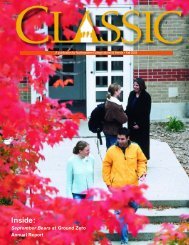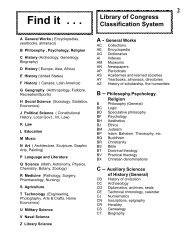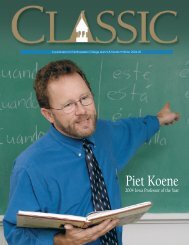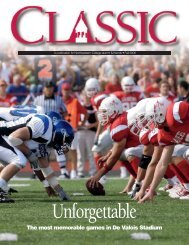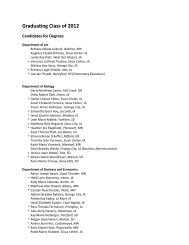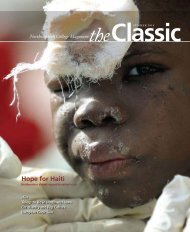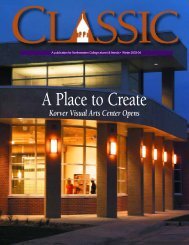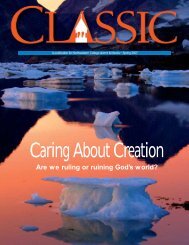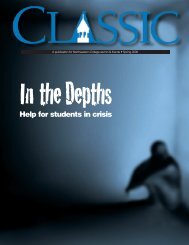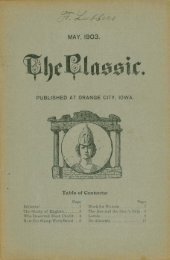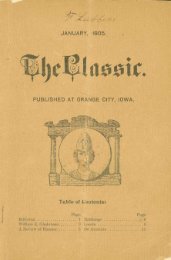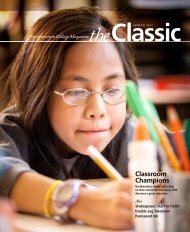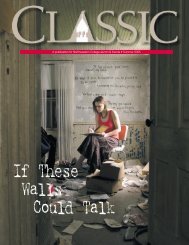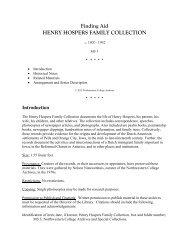Summer 2009 - Northwestern College
Summer 2009 - Northwestern College
Summer 2009 - Northwestern College
Create successful ePaper yourself
Turn your PDF publications into a flip-book with our unique Google optimized e-Paper software.
Magazinethe ClassicSUMMER <strong>2009</strong><strong>Northwestern</strong> <strong>College</strong> Changing TracksNew career directions bring alumni fulfillment and challengeAlsoLoving God, Living GreenService MastersTop Geeks
16Competing among the top 100computer programming teams inthe world, <strong>Northwestern</strong>’s teamattended opening ceremonies atStockholm City Hall, where NobelPrizes are awarded.Classic PeopleEditorDuane Beeson712-707-7116beeson@nwciowa.eduStaff WritersCarrie (Odell ’01) AndersonDuane BeesonAnita CirulisTeri ElgersmaTamara FynaardtDesignersJohn Vander Stelt ‘83Ryan JamesRoy TrevinoWeb DesignerDan Robinson ‘01The Classic is published quarterly—in March, July, October andDecember—for alumni and friendsof <strong>Northwestern</strong> <strong>College</strong>. So namedbecause it served what was thenknown as the <strong>Northwestern</strong> ClassicalAcademy, the Classic was theschool’s first student newspaper,begun in 1891. It has been an alumnipublication since 1930.Send correspondence or addresschanges to the Classic, <strong>Northwestern</strong><strong>College</strong>, 101 7th Street SW, OrangeCity, IA 51041-1996 or classic@nwciowa.edu.Opinions expressed in the Classicdo not necessarily reflect the officialposition of <strong>Northwestern</strong> <strong>College</strong>.141812141820ContentsGreen PleaMatthew Sleeth, a medical doctor who now is a creationcaremissionary, talks about the connection between lovingGod and living green.Committed ServantsJohn Greller and Carl Vandermeulen retire after acombined 42 years of student-centered service.Unsung HeroesWilling to tackle plugged toilets and pranked dorms,<strong>Northwestern</strong>’s maintenance staff restores order tothe campus.Changing TracksMoving from biochemical research to archival work andfrom the postal service to the pastorate, NWC alumniare charting new career paths—and having the time oftheir lives.On the WebDepartments2 Zwemer ViewOn the cover:Taking a new career journeycan be a test of faith. Severalalumni share their storiesfrom the other side.Restoring OrderAgainst their better judgment, members of<strong>Northwestern</strong>’s heroic maintenance staffshare memories of worst messes and more.Your TurnAdd your comments to any article in thisissue, including sharing ways you havechanged your lifestyle to take better care ofGod’s creation.3 In Box4 Around the Green6 Of Course9 Face Value10 1,000 Words25 Red Zone26 Class Notesvisit classic.nwciowa.edu32 Classic Thoughts20<strong>Northwestern</strong> Classic1
Zwemer Viewin BoxDan RossThe Community of ChristIconcluded my last Classic column by stating that while the times we are experiencingmay be economically uncertain, we serve a God who is unchanging, unshakable andworthy of trust. At the time, I had no idea how my own faith would be tested in newways in <strong>2009</strong>.Over the holidays, my wife, Michelle, and I were hoping that after two years ofsignificant transition we would be able to settle into some sort of normalcy in <strong>2009</strong>. Thatdesire quickly faded when on Jan. 5 we sat in a doctor’s office listening to the numbing newsthat Michelle had breast cancer.Since that day, we have been on a seemingly never-ending trip to see surgeons,oncologists and other specialists. It has been a challenging first half of the year. However,as Michelle and I have been reminded often through this process, our God is sovereign. Heknows every detail of our lives, including the journey we have been on. We know his graceis sufficient for us and that all things work together for good to those who love God, tothose who are the called according to his purpose.These truths are easier to claim, though, when not on the path we have been walking.This experience has given us a new picture of what it means to suffer. We have found muchencouragement from Isaiah 41:10: “Fear not, for I am with you; be not dismayed, for I amyour God. I will strengthen you, yes, I will help you, I will uphold you with my righteousright hand.”While it has been a difficult journey, Michelle’s prognosis for a full recovery is quitepositive. We’ve been reminded God can bring good out of any circumstance, includingcancer. The genuine love, care and concern shown to us by the <strong>Northwestern</strong> community,our new church family at Trinity Reformed, and others in the local community have beenoverwhelming.Board members, faculty, staff, students, alumni and friends have bathed us in prayer,provided meals, watched our kids and even cleaned our home. This has been one of themost humbling experiences of our lives as so many have served us with the hands and feet ofJesus.On the day before Michelle’s last chemotherapy treatment in May, many of these samepersons joined Michelle, me and our kids as we participated in the inaugural Race for theCure in Sioux City, an event to raise funds for breast cancer research. With over 80 runnerson Team Michelle, we had the largest team of any entered in the race.Before arriving in Orange City, Michelle and I had heard a lot about the distinctivelyChristian community of <strong>Northwestern</strong>. Now we’ve experienced it. We know its strong,loving power firsthand. What a blessing it is to serve here. We praise God for each andevery person in the <strong>Northwestern</strong> family.Greg ChristyPresidentFrom the Classic websiteThe following readers posted comments about Classic articles atclassic.nwciowa.edu.Classic ThoughtsGreat article! I felt like I was on the boat with your family, feeling seasick likeyour father but holding on to that dream to get me through to the next day. Amazingfaith and courage is what brought immigrants over to our country. Hard work andperseverance brought us to the standard of living we enjoy today. Avarice andgreed have replaced the faceof the wide-eyed industriousimmigrant and are taking usdown a different road. Do weneed to ride the stormy wavesfor a while until we can findourselves again and land incalmer water? Thank you forsharing your heart-warmingstory.Colette Knudsen1,000 WordsThe photos and text inyour “Splash” photo essay brought a smileto my face. I strongly suspect I am responsible for the adjective “Mighty” in the “Battleof the Mighty Floyd.”When teaching organic chemistry at NWC, I used a simple analogy to explain thebasis for chromatography—a common chemical separation method. I referred to the“Mighty Floyd” (a tongue-in-cheek takeoff on the Mighty Mississippi) as analogous tothe mobile phase, a group of waders to the stationary phase, and a bunch of floatingbeach balls to the sample. (Doug Elrick ’87, a former NWC student of mine whoworked as a forensic scientist at the Iowa Division of Criminal Investigation, told me heonce borrowed my analogy to explain chromatography to a jury.)Dr. Peter HansenIowa City, IowaTackling the IssuesAnita Cirulis wrote an excellentpiece, “Land of Opportunity,” inyour spring issue. She tackled avery thorny topic and presented itas an issue of humanity, not justlegality. I wish all local residentsand our state and national leaderscould understand the issue sowell; perhaps we’d get morethan posturing and inaction inactually addressing the 12 millionundocumented who live amongus—always in fear of a misstep, alltoo often the victims of prejudice,hearing the voices of those whosay they’re Christians but thentreat other human beings withouthumanity.I receive several collegepublications, but the Classic is theonly one that includes real issuesand presents them in a thoughtful,well-researched manner. Pleasecontinue to help our youngmen and women become adultswho will help solve the world’sproblems as you educate morethan just the mind.Donna HoadleySheldon, IowaNew PerspectivesThank you so much for yourcover article on immigrationin the past issue. I greatlyappreciated the nonbiased, yetinformative, writing. There weremany issues brought up I hadnever thought of before, suchas the difficulties of employershere in the United States andhow much the trade industryaffects the desire to come to theMidwest.I believe this article represents<strong>Northwestern</strong> well in that it isopen-ended and allows readersto form their own opinions. Thisis exactly what I encounteredat <strong>Northwestern</strong>. Thank you somuch for covering this importanttopic, especially since it will affectus all—if it hasn’t already!Carrie Mathison ’08Preston, Minn.Focused onImmigrationGood work with theimmigration feature in the springissue of the Classic. Immigration isan issue I’m interested in workingwith after law school, and Iwas impressed with the rangeof perspectives you were able topresent. I think you providedan unbiased, but compassionate,story.Laura Jacobson ’08Williamsburg, Va.No Easy AnswersI read with interest the article,“Land of Opportunity.” It mademe realize how complex theissue of immigration is and howoverwhelming the policymakingdecisions are. Perhaps the controlshould have been started manyyears ago.Eloise ChristieAlgona, IowaWE LOVE GETTING MAILSend letters to: Classic,<strong>Northwestern</strong> <strong>College</strong>, 101 7thStreet SW, Orange City, IA 51041;e-mail: classic@nwciowa.edu;fax: 712-707-7370. Letters may beedited for length and clarity. Pleaseinclude an address and daytimephone number.2 SUMMER <strong>2009</strong><strong>Northwestern</strong> Classic 3
AROUND THE GREENDan Rossaround the GreenServant ScientistRandy Van Peursem ’92, science support services coordinator and academic adviser toabout 60 biology majors, received the $500 Staff Recognition for Inspirational ServiceAward this spring.Green GenerationInstead of collecting quarters, Heemstra Hall guys are seeking clothespins. That’sbecause they’ve been hanging their clothes to dry rather than using machines. A hallclothesline, constructed by Matt Leither, was one of four student projects that receivedfunding during <strong>Northwestern</strong>’s Day of Learning in Community (DLC), which focused oncreation care.Ericha Walden invited DLC participants to the college’s costume shop, where sheprovided scrap fabric, yarn and other material as art supplies. Two textile creations werelater auctioned off, with proceeds donated to an area homeless shelter.Heidi Doty is using her award to create notebooks from cereal boxes and unusednotepaper. The recycled notebooks—with tips for living green in college—will be given toincoming freshmen.Recycling is also behind a composting project proposed by Heather Talbot and MattVander Molen. They are arranging for cafeteria leftovers to become compost for the Gardenof ARC, a community garden at Orange City’s American Reformed Church.<strong>Northwestern</strong> students areministering on six continentsthrough the <strong>Summer</strong> of Serviceprogram.<strong>Summer</strong> Lovin’Eighteen NWC students aregiving—and receiving—Christ’slove around the globe as shorttermmissionaries this summer. Asmembers of the <strong>Summer</strong> of Serviceteam, the students are ministeringin 15 different countries, includingHaiti, Bolivia, Cameroon, Moldovaand the Philippines.They are assisting pastors, physiciansand other missionaries inchurches, hospitals, clinics, schools,orphanages and refugee camps.They are performing construction,planting churches, deliveringcommunity health programs,and teaching English as a secondlanguage with ministries such asInternational Teams, the Luke Society,Navigators and Youth Witha Mission.Two years ago, every studentin Organic Chemistry wore shirtswith Randy Van Peursem’s face onthem. And when the call went outfor candidates for <strong>Northwestern</strong>’s<strong>2009</strong> Staff Recognition for InspirationalService Award, 22 studentssubmitted endorsements on hisbehalf—along with four nominationsfrom faculty and staff.Why do people describe the coordinatorof the academic supportdepartment’s science center withsuch phrases as “a phenomenalasset,” “the reason I’m passing O-Chem” and “nearly irreplaceable”?Robben Schat ’09 has theanswer: “He has devoted himselfto helping students succeed like noone else.” Senior Erin Brogan clarifies:“Randy patiently and expertlyexplains answers to questions inthe way each student learns best.He is more than willing to give usextra time. Randy is a true testamentto Christian servanthood.”Perhaps part of the reason VanPeursem has so many admirers isthey know what he’s overcome tohelp them.Fifteen years ago, he had toleave medical school. He was frequentlydizzy, continually nauseousand had dangerously fluctuatingblood pressure.Diagnosed with allergy-relateddysautonomia, a disease of theautonomic nervous system, VanPeursem was confined to his homefor two years. After making dramaticchanges to his diet and surroundings,he was able to tutor at<strong>Northwestern</strong> three hours a week.Now full time, he works afternoonsand nights because he doesn’t feelwell in the mornings.Yet Van Peursem is a firmbeliever in Romans 8:28. He oftenoffers advice for people sufferingfrom allergies, and he encouragespre-med students to be aware ofsimilar cases when they becomedoctors. And he has discovered thejoy of helping students understanda new concept.“I love what I’m doing,” he says.Dave DunkelbergerLinda Van RoekelOn BoardTwo alumni, David Dunkelberger ’85 and Linda Van Roekel ’69, attended<strong>Northwestern</strong>’s spring Board of Trustees meeting in April as new members.Dunkelberger is serving as a trustee by virtue of his role as the president of<strong>Northwestern</strong>’s National Alumni Board. A resident of Waconia, Minn., Dunkelberger iscorporate credit consulting manager for Wells Fargo.Van Roekel, a board member from 1996 to 2004, retired from a career in thechemical industry in 2005. Her most recent position was vice president and generalmanager for Inficon in Syracuse, N.Y. She now lives in Urbandale, Iowa.The Class of <strong>2009</strong><strong>Northwestern</strong> awarded 283 diplomas toits second-largest graduating class duringcommencement ceremonies on May 16.This year’s graduates already have jobs withorganizations like The Segal Company, FamilyCrisis Center, Hanford Christian School inCalifornia, Thrivent Financial and OrangeCity Area Health System. They will be livingin places like Sioux Falls, Chicago, Seattle andIndia.Other new alumni are entering graduateprograms at Duke, Princeton, Yale, and theuniversities of Iowa and North Carolina.Biology-health professions major Tyler De Jong of Long Beach,Calif., was among 283 graduates at commencement in May.Dan Ross4 SUMMER <strong>2009</strong><strong>Northwestern</strong> Classic 5
AROUND THE GREENAROUND THE GREENOf CourseDan RossIntelligence FilmsIn addition to viewing PBS’sfive-part series The Secret Life ofthe Brain, campers spend theirfree time watching flicks like ABeautiful Mind, Lorenzo’s Oil andAwakenings. Davis also providestitles of other movies that getviewers thinking, including: A.I.,As Good as It Gets, At First Sight,Benny & Joon, Blade Runner,Charly, Coma, eXistenZ, Flatliners,The Lawnmower Man, One FlewOver the Cuckoo’s Nest, Outbreak,Rain Man and Sleepy Hollow.Brain Camp<strong>Summer</strong> Camp<strong>Northwestern</strong> Neuroscience Camp (for highschool juniors and seniors)Camp Director/InstructorDr. Ralph DavisAssociate Professor of Biology<strong>Summer</strong> campers rarely get a lot of sleep.That may be true for participants in<strong>Northwestern</strong>’s Neuroscience Camp too,although campers do get an opportunity for anap at least one afternoon during the week.Of course, they have electrodes attached totheir heads—and they have to try to snoozewhile someone studies their brainwaves.When it started four years ago, <strong>Northwestern</strong>’sNeuroscience Camp was one of a kind. In fact, it has been citedamong other unique summer camp offerings by both theNew YorkTimesand theLondon Times. Last summer Dr. Ralph Davis hadnearly 50 inquiries from across the U.S.; the hometowns of the 20campers he accepted included Kennebunk, Maine; Nacogdoches,Texas; New York City; and Paullina, Iowa.After presentations on neurons, nerves and neurotransmittersignals, campers perform electrophysiology experiments onearthworms and dissect a sheep brain. In addition to recording eachothers’ brainwaves, they also volunteer for lie detector tests andtake a field trip to a cadaver lab where they view a human brain andspinal cord. The teenagers also participate in traditional summercamp activities like bonfires, Frisbee golf, and perhaps pullingexceptionally clever pranks on fellow campers.One or two of the participants eventually enroll at NWC.Others are already accepted at universities like Brown, JohnsHopkins, Stanford and Yale. Still, their glowing post-campcomments indicate their <strong>Northwestern</strong> experience, though brief, isone that will stick in their minds.Money forMedicine<strong>Northwestern</strong>’s Bachelor of Sciencein Nursing program received a shotin the arm this spring with news itwill receive a federal appropriation of$423,720 in fiscal year <strong>2009</strong>.Nursed along by Senators TomHarkin and Chuck Grassley and Rep.Steve King, the appropriation will fundequipment for the college’s nursing artslaboratory, including additional humanpatient simulators, an electronic healthrecord simulation program, hospitalbeds, a medication system, IV trainingarms, and computer-based resourcesfor nursing professors.In addition, improvements willbe made to <strong>Northwestern</strong>’s biologyand chemistry laboratories, which areused heavily by nursing and otherhealth care professions students. Theappropriation will pay for the purchaseof an autoclave, a fluorescencespectrometer and other equipment.Renovations this summer will result ineven safer student workstations and anexpanded chemical stockroom.“We made this federalappropriation request knowingthe national nursing shortage is ofparticular interest to our members ofCongress,” says President Greg Christy.“Our education of nurse professionalsin a Christian environment bothhelps abate that shortage and alsocontributes to holistic healing.”Top TeacherYou won’t catch students in some ofJohn Vonder Bruegge’s NWC classessaying, “It’s all Greek to me.” Unless theymean it as a compliment.“In Greek, he takes a hard subject andbreaks it down as best he can so we canlearn,” says senior Nathan Lichter. “Heshows a great interest in helping studentsactually understand. He teaches in a waythat shows his love for both Scripture andhis students.”Vonder Bruegge’s teaching style,concern for students and quirky sense ofhumor led to his selection as this year’srecipient of the $1,500 <strong>Northwestern</strong>Teaching Excellence Award. The religioninstructor, in his fifth year at NWC, wasselected for the award from among 27nominees by a committee of students andfaculty.Sara Moser ’09 says after her first classwith Vonder Bruegge, she made sure totake one of his courses each semesterbecause she knew she would be passionateabout it.“He has the distinct abilityto make any subject matterabsolutely fascinating,”says Moser. “He hashigh expectationsforstudents butis encouragingso students feelthey can actuallymeet them. In fact,because studentsrespect him so much,they really strive to meethis standards.”<strong>Northwestern</strong> Teaching Excellence Award winner John VonderBruegge earned a master’s degree from Harvard and is a Ph.D.candidate in religious studies at Yale University.Program makes the grade<strong>Northwestern</strong>’s teacher education program passed its latest testswith flying colors, earning continuing accreditation from the NationalCouncil for Accreditation of Teacher Education (NCATE) and approvalby the State Board of Education after a joint evaluation visitlast fall. Only three other education programs in Iowa—Graceland,Luther and Wartburg—are accredited by NCATE.Laura Heitritter, instructor in education, says the reviewers wereimpressed by the department’s students, particularly by the fact thatthey led the first session of the site visit. The visitors also reportedhearing very good comments from alumni and area educators andcommended the program’s efforts to expand students’ understandingof and experience with diversity.ToM BECKERjIM HEEMsTRa ’72Evaluators said one of the teacher education program’s strengths is the amount ofclassroom experience students receive before they do their student teaching.6 SUMMER <strong>2009</strong><strong>Northwestern</strong> Classic 7
AROUND THE GREENAROUND THE GREENFace ValuePurposeful<strong>Northwestern</strong> students are gettingministry experience—and churches andcommunities are getting a helping hand—thanks to a summer internship programfunded in part by a grant from the LillyEndowment. The internships give studentsthe opportunity to work alongside mentorsin a variety of ministry contexts.Eight students interested in the pastorateor other roles in the church are servingin Reformed churches in Illinois, Iowa, NewJersey, New Mexico and Washington, aswell as in a Baptist church on the GrandPortage Indian Reservation in Minnesota.Another 13 students are at one of eightChristian Community Development Associationministries: Cary Christian Centerin Cary, Miss.; City Mission in Detroit; Hopefor Opelousas in Opelousas, La.; the JohnM. Perkins Foundation in Jackson, Miss.;Mile High Ministries in Denver; MissionWaco in Texas; Trinity Christian Communityin New Orleans; and Urban Ventures inMinneapolis.Bravo!Terror Texts, scripted by theatreprofessor Jeff Barker, continues to winawards. In April the musical’s composers—Joseph Barker and Dr. Heather Josselyn-Cranson, <strong>Northwestern</strong> music professor—received a special commendation from thenational Kennedy Center American <strong>College</strong>Theatre Festival.Barker’s compositions includedindustrial rock, classic rock and folk songs.Josselyn-Cranson composed the show’schoral music.Healthy Report<strong>Northwestern</strong>’s Bachelor of Science in Nursing program has been given a clean bill of health by the Commission on CollegiateNursing Education (CCNE), which granted the department an initial five-year accreditation.The checkup was the culmination of four years of program planning and implementation by Dr. Ruth Daumer, department chairperson,and a growing nursing faculty. It also came just in time for NWC to award degrees to its first eight B.S.N. graduates.A three-member team of nurse professionalsfrom the CCNE visited campuslast October. They interviewed nursingstudents, faculty, college administrators,community leaders and health care professionals.They also observed nursing andother science classes, labs and clinicals.The evaluation results affirm boththe college’s commitment to the nursingprogram and the nursing program’s “greatfit” as part of <strong>Northwestern</strong>’s mission.Evaluators noted the program alreadyis “part of the fabric of the college” andpraised “the unique character of thestudents and faculty with respect to theirRachael Mineart participated in the nursing program’s first trip to Tanzania last summer,Christian ethos and values.”where students learned about medical care and public health in developing countries.<strong>Northwestern</strong>’s study abroad requirement for nurses is unique among B.S.N. programs.Chief FundraiserWhen <strong>Northwestern</strong> looked for a new vice president for advancement to replace the retiring John Greller,the college found its best candidate in Greller’s second-in-command.Jay Wielenga ’82, NWC’s director of advancement since 2001, succeeded Greller in leading <strong>Northwestern</strong>’sfundraising efforts. He assumed his new duties July 1.“Jay brings to the position similar relational skills as John, as well asnew ideas for how to further the mission of <strong>Northwestern</strong>. He’s been avery loyal member of our advancement team and has done a great jobof developing relationships with our constituents,” says President GregChristy.Wielenga first joined the staff as alumni director in 1995. In recentyears, he provided interim leadership to the office when Greller’s healthpreventing him from working.Wielenga relishes his new role.“I love <strong>Northwestern</strong> <strong>College</strong>,” he says. “To help make its missionpossible through raising funds and strengthening relationships withalumni and friends of the college is exciting to me.”A graduate of the National Planned Giving Institute, Wielenga spent10 years as a medical representative for Syntex Laboratories and threeyears in admissions and financial aid at the University of Sioux Fallsbefore joining the advancement staff.Jay WielengaLab TimeWhile some mow lawns,wait tables, roof houses orbabysit children this summer, sixNWC students are honing theirresearch skills in off-campusprojects.Jordan Larson is conductingresearch at the University ofNorth Dakota Medical School.He is exploring a lipid metabolicpathway’s role in inflammationcontributing to cell loss andmemory dysfunction.Josh Locker is interning in alab at Sanford Health in SiouxFalls that is focused mostly oncongestive heart failure.At Johns Hopkins University,Curt Van Wyk is working in theCenter for Language and SpeechProcessing. He is parsing textualdata for acquisition of semanticknowledge that can be useful insearch engines.Three students are at theUniversity of Iowa. RachellePedersen is studying the effectsof depression on older patients’psychosocial behavior andcognitive abilities. Kelley Salemis working in a lab that focuseson DNA replication, repair andmutagenesis. And Alex Menningis assisting Dr. KarissaCarlson, assistant professor ofchemistry at NWC, in conductingfluorescence-based assaysto investigate protein-proteinand/or protein-DNA interactions.That research is part of afellowship designed to form newconnections between the state’sscientists and the university.Pam VliegerFriendly servantName something about your work you reallyenjoy.I like being able to serve others andhelp them go about their mission. I reallyenjoy interacting with others. And I havefun operating all these cool machines! I’mconstantly learning.What is one of your lesser-knownresponsibilities?I’m kind of the information booth personof Zwemer Hall. Since my office is close tothe door, people naturally drop in and ask fordirections or other information. I don’t alwayshave the answers, but I usually know someonewho might.Why did you want to work at NWC?When I started many years ago, it wasbecause it was a better job than waitressing. Asthe years have gone by, the reasons I stay haveincluded because I could be flexible with myfamily commitments and because I developeda better understanding about the mission of<strong>Northwestern</strong>.What is one of the most common questionsyou’re asked?Pam, do you have time to …?What are your hobbies?I love to cook. I don’t mean just cooking, butbaking and canning too. That has led to anotherhobby: collecting antique and old churchcookbooks. I have well over 100. I also read asmuch as I can, listen to music, and like to playgames.What is your favorite time of day, and why?The morning is definitely my favorite time.It is like having a clean slate—a new day to dothings differently or better, to help people withmore of a servant’s heart, to make them smile.DoUG BURGPam Vlieger ’94 started in <strong>Northwestern</strong>’sadmissions office in 1982. Over time she workedin printing services and the bookstore and was apart-time student. Since 1997 she has served as theprinting services manager.What is one of your favorite NWC memories?My favorite was the time Tress Jacobsma hadto hoist me through a window to get into theold storage room in Zwemer because the doorhad been locked accidentally and there wasn’t akey to open it. The funniest part was that once Igot through the window, I had a big drop to thefloor. As I negotiated my drop, the bottom of myjeans became impaled on a nail along the windowledge and I ended up hanging there upside down!It took me about five minutes to disentanglemyself because we were laughing too hard to doanything.If you’d like to see a particular <strong>Northwestern</strong>faculty or staff member featured in Face Value,e-mail classic@nwciowa.edu.8 SUMMER <strong>2009</strong><strong>Northwestern</strong> Classic 9
1,000 WORDS 1,000 WORDSThe world is a classroom for students who study abroad in countries like Russia,Ecuador, India, Thailand, England, Tanzania and Egypt. Some take a summermonth to study with NWC professors. Others spend a semester in Romania,Oman or other nations. Wherever they go, students see and learn about thepeople and cultures God loves—and are better prepared to participatein his transforming work in the world.10 SUMMER <strong>2009</strong><strong>Northwestern</strong> Classic 11
An interview with J. Matthew Sleeth, M.D.Formerly an ER doctor and chief of staff, Matthew Sleeth gave up medicine to care for an ailingearth when he became a Christian. Author of Serve God, Save the Planet, Sleeth travels the U.S.,teaching and preaching about caring for creation. When he visited <strong>Northwestern</strong> in April as thekeynote speaker for the college’s second annual Day of Learning in Community, Classic staff askedhim, among other things, what green living has to do with loving God.Classic: In your book, you describe some pretty drasticlifestyle changes your family has made to live more in linewith God’s plan for the planet. Describe some of thoseadjustments.Sleeth: We started where most beginners do, with recycling.Now we also precycle, which means considering the amountof packaging and other wastethat will be generated beforeyou buy something. Then weadded more difficult things,like gardening, washing dishesby hand, and hanging clotheson the line—even in winter.Eventually we moved from adoctor-sized house to one thatwas smaller. Now we live ina house the size of our formergarage, and we don’t own aclothes dryer or dishwasher.Classic: Your family—yourkids—went along with this?Sleeth: My kids were spoileddoctor’s kids when we started,but now they think nothing ofhaving to do the dishes. I’mlucky: My kids seem to likephysical labor. It’s hard as aparent to tell your kids we’re going to do without things theirfriends have—we’re going to be a bit peculiar. But part of theChristian life is living in restraint. Recently a mom admittedto me they’ve gone to disposable dishes for every meal.Where is that kind of toss-it-in-the-trash lifestyle headed?Classic: How do Christians, in particular, respond to yourpresentations about living more green?Sleeth: Although many Christians have views on this (andsome of them believe God doesn’t care about going green—it’s a political movement, they argue, not a faith issue), Ifind many of them have never gone to their Bibles seekinganswers to environmental concerns. I’ve never encounteredanyone who’s against what I share once they’ve gone to theirBibles themselves saying, “God, teach me about this.” Most ofthe time, they find their views are based on politics too—andnot on what the Bible teaches about creation and how to carefor it.It’s a sin to tear God’s world apart. When I teach or preach, Itry to make it really simple: I say, “Imagine the world is onesquare mile. You live downstream, and I live upstream. Whatdo you want me to put in the water—or not put in it?” If I putsomething in the water that I know might hurt you, that’s asin.Classic: Why don’t we hear sermons about environmentalissues?Sleeth: Remarkably few pastors have been equipped topreach and teach about creation care. That’s why I’ve startedtraveling to seminaries. Also, it’s hard for a pastor to get upand give a sermon that challenges congregants’ lifestyles. Saya Midwestern pastor preaches on biblical agricultural lawsand asks, “What does this mean for feedlots—and those of uswho like our meat cheap?”Classic: What are some specific ways churches and collegeshave responded to your creation-care message?Sleeth: At one church, everyone agreed to forgo Christmaspresents for one year, and they put that money—$290,000—toward a clean water project in Afghanistan. Another churchraised money to buy all their households rain barrels. Theyalso stopped using disposable dishes for church events.(All the men volunteered to do the dishes, which wasunanimously endorsed by the women.) They dedicated themoney they saved for feeding ministries. A college did awaywith trays in their cafeteria and saved 16,000 pounds of foodwaste in one year.Classic: Some Christians don’t believe global climate changeis real. Does it matter?Sleeth: People use arguments over an issue like this sothey don’t have to meet their responsibilities toward God’screation. You don’t have to believe global climate change ishappening to know water shouldn’t have dioxins in it or thatthe air as you drive into a city shouldn’t look like a dome ofsmog and haze. Christians can usually still agree we shouldbe consuming less and freeing up more of our resources forthe church’s work. Everyone—including Christians—can dosomething about caring for creation every part of the day. Noexcuses.Classic: Given the current state of our economy, we’ve beenwarned not to severely limit our consumption or the U.S. andglobal economies could collapse. Thoughts?Sleeth: Our economy may have to collapse. We’ve beenheating the house by burning the furniture. There’s no wayto dig yourself out of a hole; you’ve got to go a differentdirection. The planet will cease to exist if every generationlives only for itself. The Bible is all about consideringgeneration after generation after generation. God is notconcerned with short-term economies. Focusing just on theimmediate future is not a biblical approach to how to live onGod’s planet.On the Web exclusiveVisit classic.nwciowa.edu to commenton Dr. Sleeth’s views and share waysin which you and your family havechanged your lifestyle to take bettercare of God’s creation.12 SUMMER <strong>2009</strong><strong>Northwestern</strong> Classic 13
Committed ServantsDan RossCarl Vandermeulen and John Grellerend their long tenures at <strong>Northwestern</strong>by AnitA CirulisDan RossWord LoverFriend RaiserCarl Vandermeulen’s voice is remarkably similar to that of GarrisonKeillor, host of radio’s The Prairie Home Companion. Like Keillor, hisspeech is soothing, unhurried, thoughtful—and he, too, is comfortablewith meanderings.“Carl’s teaching is unique,” says Dr. Joonna Trapp, a colleague in theEnglish department. “Rarely straightforward and direct, he finds himselfwandering along paths of inquiry, inviting students to follow him.”With Vandermeulen’s retirement after 25 years at <strong>Northwestern</strong>,students will have to follow someone else in more than one department.Vandermeulen initially joined the college’s faculty on a part-time basisto teach communication studies courses. A year later, he began servingas the adviser for the Beacon, the student newspaper—a natural rolefor someone who taught News Writing and Editing, Feature Writing,and Layout and Design. Then came added responsibilities in theEnglish department, where he helped establish a writing center, wrotethe curriculum for its writing courses, and later was lead writer for thewriting and rhetoric major.As varied as Vandermeulen’s roles have been, most have revolvedaround the written word: teaching journalism and literature courses,directing the English education program and supervising its studentteachers. He even helped craft the proposal that brought a $2 millionLilly grant to NWC—an achievement he described as “satisfying”because of its impact on the college.“I’m a word nerd,” Vandermeulen says, “someone who loves storiesand poetry and the magic of language.”He’s also someone who preferred listening to lecturing. Instead ofa monologue, Vandermeulen favored dialogue, explaining things tostudents and then posing questions that allowed them to discover whatthey had to say and the pleasures of saying it.VANDERMEULEN CLOSE-UPYear hired by NWC1984EducationCalvin <strong>College</strong> (A.B.), University of South Dakota (M.A.), University ofNebraska-Lincoln (Ph.D.)Teaching careerSpent entirely in Orange City (Vandermeulen taught at Unity Christian HighSchool for 14 years before joining NWC’s faculty, and at least 23 current NWCfaculty and staff were at one time his students in high school or college.)Estimated number of student papers read while at NWC12,500“I tried to create a community in the classroom where students wereinterdependent and learned from each other,” Vandermeulen says. “Ifthey trusted the process and engaged in it, they finished the course ableto do what they weren’t able to do when they started, with a differentsense of who they were and what they were capable of knowing andbeing.”Years after taking his classes, <strong>Northwestern</strong> alumni report thatVandermeulen—in his soft-spoken way—did just that.Growing up in Washington, D.C., John Greller was expected to go toa good school, get good grades, obtain a good job, and earn good money.Instead he came to know Christ and dedicated himself to building God’skingdom by helping others give their money away.After 30 years in fundraising—more than half of which were spent at<strong>Northwestern</strong> <strong>College</strong>—Greller is retiring. Just as he felt called by Godto NWC, he believes God is making it clear it’s time to leave: Plans toretire in a year and a half were moved up when he was recently diagnosedwith Parkinson’s disease.This isn’t the first health challenge Greller and his wife, Janeo, havefaced. A few years after becoming <strong>Northwestern</strong>’s vice president foradvancement, John experienced kidney failure due to diabetes. He wentthrough two transplants, the second time getting a kidney from his sonBrian after his body rejected the first organ.Throughout his illnesses, surgeries and hospitalizations, Greller hasimpressed others with his unwavering faith in and love for God. “Hisfaith in the Lord is the first thing you see when you meet John,” says hiscolleague and successor, Jay Wielenga ’82.Equally as notable about Greller is his deep love for people and for<strong>Northwestern</strong>.“When John created new friends for the college, it was sogenuine,” says Drew Vogel, Board of Trustees chair. “He showed what<strong>Northwestern</strong>’s mission is all about. He and Janeo fell in love with<strong>Northwestern</strong>, and then he always said [his job] was easy.”The Grellers are known for their hospitality, opening their home tostudents, colleagues and friends of the college. John regularly attendedchapel, and Janeo joined him for meals in the cafeteria with students andin cheering the Raiders at athletic contests.Those familiar with John’s deep bass voice and hearty laugh also knowhe has a gift for listening to, caring for and encouraging people. In fact,it’s his people skills that made him so successful at his job. As Grelleroften pointed out, “Fundraising is really friend raising.”With Greller’s retirement, both <strong>Northwestern</strong> and its alumni andsupporters are losing a true friend.GRELLER CLOSE-UPYear hired by NWC1992EducationKenyon <strong>College</strong> (B.A.), Oberlin <strong>College</strong> (M.A.T.)Total raised for NWC during his tenure$67 millionMost fulfilling fundraising accomplishmentRaising money for the DeWitt Theatre Arts Center“The theatre was in the most disrepair of our facilities, and yet it was one of ourfinest departments. I lobbied for making it a priority. I didn’t want to lose facultymembers and see the program go down the tubes.”One MoreDr. Kimberly Utke Svanoe, professor of music, announced her retirement after thedeadline for this issue. A feature on her will be included in the fall Classic.14 SUMMER <strong>2009</strong><strong>Northwestern</strong> Classic 15
initializing...>loading text...>setting font...>printing article...“Brute force.”“Excuse me?”“Brute. Force.”“That’s a programming language?”“No, it’s a programming strategy. You brute force the differentpossibilities and then use the binary search to calculate the maximumintervals.”Ben Kester is explaining how he and teammates John Calsbeek andCurt Van Wyk should have tackled their first problem at the Associationfor Computing Machinery(ACM) InternationalCollegiate ProgrammingContest in Stockholm,Sweden, in April.The question that requiredsuch an aggressive approach?You are an air trafficcontroller with a bunchof planes to schedulefor landing. (The worldcompetition questionprobably didn’t use the term“bunch,” but Calsbeek says“bunch” when he’s describingtheir first challenge.) Allthe planes are assigned aninterval of time within whichCipher SuccessStudent computer programmers crack code andearn trans-Atlantic trip to world finalsby tAmArA FynAArdtthey can land. Figure out which plane can land when and where so allthe planes are landing with the longest span of time between descents—because that’s the safest, obviously.Now it’s time for brute force?“Yes,” says Kester. “You brute force the different possibilities. That’sbasically just programming the computer to try every single combinationuntil you find one that works. Brute force is pure trial and error versushaving a strategy that guides your trial and error. It’s like trying to open apadlock by trying every possible combination.”You couldn’t really do that, could you?“No, but a computer could.” Or, a computer manned by pretty brightprogrammers.So, did they get everyone on the runway safely?“Not this time,” says Kester.The annual international ACM competition, sponsored by IBM,includes the top 100 college-level programming teams in the world.During the opening ceremonies, in the same auditorium where theNobel Prizes are handed out, “<strong>Northwestern</strong> <strong>College</strong>” boomed across thehall, amidst introductions of teams from MIT, Moscow State University,Oxford, Stanford, the University of Melbourne and the University ofWarsaw, to name a few.Representing the smallest U.S. school at the world competition,Calsbeek, Kester and Van Wyk were frequently mistaken for<strong>Northwestern</strong> University students. When they corrected yet anotherperson who assumed they were from the Big 10—describing their 1,200-student campus in a town of 6,000—the well-wisher said, “Wow. Youmust be pretty much heroes there.”En route to Europe, the heroes of 1s and 0s had already out-codedtheir competition at a regional programming competition last November,correctly completing all nine problems to finish fourth.They had less success with the 11 problems at worlds. “We wentfor a high-risk, high-reward strategy,” blogged Kester during a breakin the competition. In adivide-and-conquer move,each teammate workedon a different problem.Unable to arrive at answers,they’d moved on to a fourthquestion when they ran outof time.“The problem with highriskstrategies?” says Kester.“The risk.”So Sweden didn’tcompute. Reprogram.Calsbeek, Kester and VanWyk are still among theworld’s best, and they haveother interests beyond binarycode.All computer science majors, they argue they transcend “Geek Squad”stereotypes. Calsbeek gestures to the three of them with a “Do you seeany pocket protectors here?” look on his face.Nope. No pocket protectors.Calsbeek, a senior, is also pursuing a literature degree. Van Wyk,another senior, is an athlete and has competed in soccer, football,basketball, baseball, wrestling and track. Kester, who graduated in May, isa social servant-leader—he was a West Hall RA and discipleship groupleader and traveled to India as a member of the <strong>Summer</strong> of Service team.Like other guys, they are gamers. But their programming prowessdoesn’t make them any better than their peers at computer or videogames like Tower Defense or Command and Conquer. Except:“Sometimes it helps you figure out how to beat the system,” says Kester.They don’t mind the term “geek,” though. “We like programming,”say Van Wyk and Calsbeek, with “no excuses” shrugs. And Kester, whoalso majored in actuarial science, had already landed a job at a Chicagoconsulting firm and passed seven of eight actuarial exams before hegraduated. “Actuarial science is kind of its own nerdy world too,” he says,grinning.Yep. They’re good with geek.Dan RossCurt Van Wyk, Ben Kester and John Calsbeek (from left) competedamong the world’s top 100 student computer programming teams inStockholm, Sweden, in April.<strong>Northwestern</strong> Classic 17
Students are the focus for a maintenancestaff that keeps <strong>Northwestern</strong> runningThis summer, junior Andy Boone is back at his job on<strong>Northwestern</strong>’s maintenance crew, and he’s like a kid atChristmas.“I’ll get to clean the Courtyard Village apartments,” says Boone. “Imight get to shampoo the carpets.”Boone can’t be blamed for talking like this. He spends his time withScott Simmelink, director of maintenance and operations, who sayssuch things as, “There’s nothing like giving students a hand at 11at night when they lock their keys in the car, or starting theircars when it’s 20-below.”Um, yeah.by Amy sCheerIn the 15th century, the word maintenance was defined as the “actionof upholding or keeping in being.” Earlier, the word was thought of asthe “action of providing a person with the necessities of life.”In <strong>2009</strong>, Simmelink puts it this way: “We try to get things back tonormal as quick as we can.”It takes 20 full-time staff, six part-time and seasonal workers, andsome 25 summer student workers to maintain normalcy at <strong>Northwestern</strong>.Plumbers, housekeepers, groundskeepers, electricians, locksmiths,heating/cooling experts and carpenters make up the crew; thereare also folks in charge of tasks from coordinating facilityand vehicle rentals to keeping up on governmentregulations for all of the above.It might be easier to list what they don’t do: classroom teaching.(“Can’t do that,” says Simmelink.)<strong>Summer</strong>s find the staff coordinating renovations, catching up onprojects, and restoring dorms to their natural state through extensivecleaning and repairs. When chests of drawers show wear from beingused all year as ladders to the top bunk, for example, that’s just “normalroutine maintenance” in Simmelink’s worldview.Boone says cleaning never feels like work around housekeepers PatBruxvoort and Kathy Kleinwolterink. Jessi Post, a senior who has worked“There’s nothing like giving studentsa hand at 11 at night when they locktheir keys in the car, or starting theircars when it’s 20-below.”maintenance the past three years, points to a game they liked to play inthe apartments.“We’d walk in and guess if it was a boys’ or girls’ roombased on what was left behind and what it smelledlike,” says Post. “I was usually right.”While summer mornings always startwith devotions, each day also has its owntheme—like “Muffin Man Fridays,”when a mystery person provides sweetsfor the crew.“I still don’t know who the MuffinMan is,” says Post, sounding a littlemiffed. “No one will give me astraight answer.”Gary Jeltema, supervisor ofmechanical services, says one of thejoys of the job is being around students.“Some you get to know because they’vedone something wrong,” he adds with a chuckle.<strong>Northwestern</strong> students have been known toexecute elaborate pranks. Jeltema won’t divulge someof them, not wanting to give current students anyideas. Instead, witness him talking about the timeall 52 chapel pews were unbolted and turned toface the back wall. Will he discuss the amount ofwork this caused his crew? Will there be a hintof resentment in his voice, a need for revenge?No. Jeltema gives the basic facts, and then makesa point of mentioning that one of the brainsbehind the stunt now runs his ownsuccessful computer business inSioux Falls.“I guess he was thinking outsidethe box,” Jeltema says, no smallamount of admiration in his voice.Each month, manymaintenance staff take a payrolldeduction to fund a scholarshipfor students who work with them.It’s a way to “give back” to thestudents, Simmelink says.“We’ve got great kids here,” hesays, momentarily forgetting aboutthe pews.Job satisfaction? Check. Theretention rate in the maintenancedepartment is arguably the best at<strong>Northwestern</strong>: Nine of the fulltimeemployees have served nearly20 years each—some as many as 26.“They have a heart for helpingMaintenance bythe Numbers26,496 rolls of toiletpaper bought each year9,450 WorkHorseindustrial rags used yearly121gallons of floorcleaner and wax appliedannually276 muffins consumedeach summerout and being a servant to others,” Boone says. “Forty hours a weekyou clean, you clean, you repeat. I’ve never once heard a personcomplain. I always see Kathy with a smile on her face.”Jeltema enjoys coming to work in the morning, he says. “We’ve gota special staff—it’s like family.”That’s how students put it too. Like the young woman standing inthe cold while her car roared back to life, who turned to Simmelinkand said, “This is just like having a dad on campus.”“It was the best compliment I ever received,” saysSimmelink, talking again like somebody who shows upday after day just for moments like this.On the Web exclusiveVisit classic.nwciowa.edu for the maintenancedepartment’s most memorablemesses and more.18SUMMER <strong>2009</strong>Dan Ross<strong>Northwestern</strong> Classic 19
ChangingTracksAlumni find both joy and risk in taking new career directionPursuing a PassionWhen pharmaceutical giant Pfizer purchased Pharmacia Corporationin 2003, it announced most of Pharmacia’s research and developmentwork in Kalamazoo, Mich., would cease. Michael Swanson ’82, aresearch biochemist, had a decision to make.Swanson had been experiencing a declining sense of fulfillment inhis job. Decisions affecting his infectious diseases research were beingdirectly. We work hard but in a relaxing environment. It’s a lot lessstressful.”Stress is one of the reasons John Liesveld ’00 left his law practicein 2006. He loved some aspects of the work—analyzing, researching,writing, competing in the courtroom. But the intense nature of many ofhis cases, such as child-custody issues, took a toll on him.by duAne beesonCHUCK KIMMERLEA former research biochemist, Michael Swanson now useshis analytical skills—and his passion for genealogy andhistory—as an archivist at the University of North Dakota.The last time the jobless rate in the UnitedStates was as high as it is now, Ronald Reaganwas proposing the Strategic Defense Initiative,Michael Jackson was moonwalking through Billie Jean,and Bill Gates was just starting to make money fromMicrosoft Word.The U.S. Bureau of Labor Statistics reports aseasonally adjusted unemployment rate of 9.4 percentfor May <strong>2009</strong>—the highest since 1983. That means 14.5million people are jobless.As whole industries hemorrhage and jobs continueto be outsourced to other countries, many Americanshave been forced to consider a career change. Othersare contemplating a new direction because of a specificpassion or family considerations.Many <strong>Northwestern</strong> alumni have successfullychanged career paths. We share the stories of severalas encouragement that—whether you have to or wantto—you can do it too.made for business and marketing—not scientific—reasons. Uncertaintiesregarding long-term support of projects were growing.The year before, he had enjoyed a moving experience in Sweden,walking the land his ancestors had farmed. It was his seventh trip toEurope, most of which involved visiting Swedish and Dutch relativesand conducting genealogical research. Long interested in history, hefound genealogy offered a new way to apply his analytical skills.Part of his severance package included assistance from a careerconsulting company. With their help, Swanson chose to pursue amaster’s degree specializing in archives and records management. Nowcompleting his first year as an archivist at the University of NorthDakota, he says, “It just seems to come naturally to me—probablybecause I have a passion for it. I really enjoy helping people more“When a lawyer answers the phone, there’s a 99.9 percent chance theperson on the other line isn’t happy. That wore me out,” says Liesveld. “Itook it home with me a lot.”Liesveld enjoyed listening to talk and sports radio and often thoughtthat could be his dream job. When the general manager of KLIN inLincoln, Neb., called and asked if he was interested in joining themorning team, saying he had always been intrigued by putting a lawyeron the show, Liesveld couldn’t refuse.Now “Jack Mitchell” on “Jack and John in the Morning,” he talksabout state politics, national issues and Husker sports every day from 6to 9. Liesveld works longer hours than he did as a lawyer—there’s a lotmore to his job than just his on-air time—but he says he’s having thetime of his life.20 SUMMER <strong>2009</strong><strong>Northwestern</strong> Classic 21
COVER STORYCOVER STORYFamily MattersMIKE MaLonEStressed by the intense nature of many of his cases, John Liesveld left hislaw practice to become a morning radio talk show host in Lincoln, Neb.“I’m getting paid to do what I like: talk, read up on topics and make peoplelaugh,” he says.Job Search 101Bill Minnick, <strong>Northwestern</strong>’s director of career development,offers these tips for alumni who are seekingemployment or considering a career change.• You have connections from the work you’ve been doing. Use that network,and don’t burn bridges.• Take advantage of <strong>Northwestern</strong>’s free services. The Career DevelopmentCenter offers self-assessment tools, a resource library, job postings, resuméreviews and interview coaching. Visit www.nwciowa.edu/cdc, e-mailcdc@nwciowa.edu, or call 712-707-7225.• Update your resumé because formats and approaches have changed.• Learn about Internet job searching.Supper’s over at the home of Hope and Reed Friese ’95, and Elijah(7) and Iris (6) are helping dad at the family business in Parker, S.D. Thekids make a good cleaning team for the Cherrybean Coffee Company:He sweeps, she mops while Reed roasts coffee.The Frieses moved back to his hometown in 2007 after he hadworked a dozen years in production and management at an aircraftpainting company near Seattle. Friese wanted a quieter, more predictableenvironment for their four children—especially Elijah, who is autistic.“Here we can let him go to the library,” Friese says. “He can get ourmail from the post office. We can give him a lot more freedom and allowhim to explore in a small town.”Friese’s high-school obsession with coffee was stoked when he lived inSeattle. Returning home, it seemed natural to start a roasting companyand coffee shop. Friese wanted it to be a true family business, so inaddition to cleaning, the kids go along on deliveries and will have otherresponsibilities as they grow.“I try to use all the flexibility I have as a small-business owner to bewith the kids when other fathers might not be able to,” he says. “I worktwice as many hours as before, but I’m more connected with my family.”Exerting InfluenceWorking in public affairs for the Environmental Protection Agencyfor 10 years, Carie (Van Hook ’87) Jasperse enjoyed her responsibilitiesand supported the EPA’s mission. But she yearned for more.“I wanted to be involved in substantive decision-making, but thepeople who did that were either scientists or lawyers. I wouldn’t be agood scientist,” says Jasperse, who majored in English and French atNWC, “so I became a lawyer.”Today Jasperse is an attorney for the Food and Drug Administration.She has been involved in legal work behind FDA warnings to companiesmarketing products said to cure H1N1 and the consumer advisoryregarding potential liver damage from Hydroxycut dietary supplements.A variety of projects compete for Jasperse’s time, and her work is morechallenging than before. But she says the fulfillment she derives fromhelping keep the public safe makes up for the stress.Timing it RightSitting in a law school classroom a couple of years ago, Fawzy Simon’90 couldn’t believe what he heard from the dean: “They tell me many ofyou have never failed.”“I’ve failed,” says Simon. “My grades at <strong>Northwestern</strong> were abysmal;I’ve been fired. Failure is a distinct advantage because I’ve learned thesun will still rise and I’ll have another shot. Some of my 4.0 classmatescouldn’t process failure.”After working in theatre, restaurants, banking and inventorymanagement, Simon became interested in law through a job as a titlecompany clerk. Watching a lot of Law & Order also played a role.In law school Simon vowed not to squander his second chance athigher education. “I was in a room full of really smart people who knew aton about what I wanted to learn and were happy to talk it over with me.Being around people younger than me forced me to work harder.”Now a public defender in Lebanon, Mo., Simon appreciates both thestructured environment of law and the opportunity to work within it tohelp others who have failed. “Essentially, I play high-stakes poker withpeople’s freedom,” he says. “I’m motivated by my desire to get a goodoutcome.”Leon Fikse’s NWC experience was similar to Simon’s. He loved thesocial life. Classes and mandatory chapel? Not so much.As a sophomore in 1968, he clearly heard God’s call to become apastor. “It was the last thing I wanted to do,” he says.Suspended from <strong>Northwestern</strong> for skipping chapel, Fikse farmedalmonds and sold used cars before beginning a 16-year career with thepostal service. Through a variety of lay ministry experiences, he began torealize the pastorate “wouldn’t be so bad after all.”The senior pastor at Bethany Reformed Church in Redlands,Calif., since 1995, Fikse loves helping people grow spiritually. And heacknowledges God’s timing was perfect.“I wouldn’t have been a good pastor in my 20s. I became wiser andlearned many lessons about dealing with people that are so beneficialtoday.”Career Leaps—and LinksFor 10 years, Lou Bram ’96 preached grace and forgiveness at aBaptist church near Mason City, Iowa. Now he busts drug dealers andinvestigates thefts as a Cerro Gordo County deputy sheriff.He changed career tracks to bring home more money so his wife,Christy (Hoffman ’96), could be with their children full time. His heartis still in the ministry, but for now his job meets their family’s goals.While his career fields may seem disparate, Bram sees similarities.“This is about building relationships, just like being a pastor,” he says.“And I’ve had many opportunities for ministry most Christians don’t getbecause of the situations I’m in.”Fawzy Simon, the public defender, also draws on past experiences inhis new role. “My theatre training is paramount,” he says. “I learned howto use my voice, memorize lines, move in a space and get into character.I’m a different person in the courtroom. I use my words, voice andbehavior to persuade.”When the Rev. Troy Van Beek ’00 started his first pastorate at the ageof 35, he found his previous business ventures created a connection withchurch members. “They sensed I had experienced the same things theyhad,” he explains.Van Beek started at <strong>Northwestern</strong> in 1986 but left as a junior afterswitching from major to major. God used his 10 years working inimplement and lawn care businesses, he says, to help him listen andprepare for ministry.Help WantedThinking about a career change? Here’s advice from alumniwho’ve been there.“Surround yourself with people you trust who will ask the right questions.”The Rev. Troy Van Beek ’00, from landscaping business to ministry“Seek advice from mentors in both your current field and the field you’reconsidering.”John Liesveld ’00, from law to talk radio“Pray—and look for the signs the Lord puts in front of you.”Karen Woudstra ’79, from education to real estate“Be patient. Be willing to take a part-time job to get your foot in the door.”Lou Bram ’96, from ministry to law enforcement“Be committed. Once you decide, work hard toward your goal.”Michael Swanson ’82, from biochemistry to archivesA coffee lover for years—he got an espresso machine for Christmas in highschool—Reed Friese is now the proud owner of a roaster that can produce5,000 pounds of coffee per month. He left an aircraft painting business tostart the Cherrybean Coffee Company (www.cherrybean.net).22 SUMMER <strong>2009</strong>23MaRK PoLLaRD
COVER STORYRed ZoneDan Ross Dan RossThe Rev. Troy Van Beek, senior pastor of Bethel ReformedChurch in Sheldon, Iowa, worked in business for 10 years beforecompleting his undergrad degree and seminary. “I wake upevery morning—even when in the midst of difficult things—andI can’t believe I get paid for doing this,” he says.A former kindergarten teacher and NWC alumni director, KarenWoudstra is now a real estate agent. “I love the challenge ofmatching a family with the right house,” she says. “I get greatjoy hearing a family loves their new home.”“I understood at a deeper level God is in control, and I learned thingsI probably wouldn’t have learned if I had completed school the firsttime,” he says.Karen (De Boer ’79) Woudstra, an agent with Northwest Realtyin Orange City, looks back on the last eight years with amazementand confidence in God’s sovereignty. She sees how her experiences intwo previous careers—20 years as a kindergarten teacher and five as<strong>Northwestern</strong>’s director of alumni relations—benefit her and her clientstoday.Her teaching skills come in handy as she helps first-time home buyersnavigate pre-approvals, offers and closings. She uses the computerproficiency she developed at NWC to complete paperwork and postlistings online. And the contacts from both positions have brought hermany clients.“I could do this for a long time,” she says, “but I’ve learned to be opento what God puts in front of me.”Costs of ChangeKaren (Goettsch ’84) Fenedick and her husband spent a year livingoff of his income so she could take computer courses. After 21 years as ananny in the Washington, D.C., area, she knew she needed technologicalskills to pursue an office job. When she landed a position sellinginsurance, she was so motivated she became one of the fastest-certifiedagents in State Farm’s history.Leon Fikse saved diligently to fund his education at WesternSeminary. But when his California house didn’t sell, their nest egg wassoon gone—as were borrowed funds from relatives. Unsure if he couldcontinue, he told God he didn’t know where to turn. “After we humbledourselves before God, our house sold quickly. God has always taken careof us,” he says.Reed Friese is learning trust after the first year of his coffee business.“My biggest surprise was how many lattes it takes to pay a light bill. I gotway more business than I expected. I also made way less,” he says.But he subleased some of his retail space to a flower shop, and he’sseen his roasting business perk up through the Sioux Falls farmer’smarket. Ultimately he savors the positives this change has brought hisfamily.Michael Swanson, the biochemist-turned-archivist, followed financialadvisers’ advice and had money saved in case he lost his job. He alsobenefited from a nontraditional-student fellowship that paid for a year ofgrad school.John Liesveld knows he could be making more money if he hadn’t leftlaw for the lure of the microphone. But he doesn’t have any regrets.“I love my job. That’s worth so much more.”Jordan Langer finished fifthin the 200-meter dash at theRed Raider Open in April.Scholar-AthletesSmart PlayTwenty-three Raiders earnedNAIA Scholar-Athlete honors thisspring, including 11 in track. Recognizedfor the second year eachwere Ingrid Carlson and JamesonGuthmiller in track, Trevor Kuiperin baseball, and golfers AnneEberline, Jamie Jeltema, JustinPannkuk, Kelsey Shiflett and LisaWiersma.BaseballClose GamesFour extra-inning lossesin the Great Plains AthleticConference—and another sixleague games in which the Raiderslost by one run—contributed toa 19-23 season. The squad was10th in the conference with an8-16 record. Brad Payne earnedfirst team all-conference honors,with Austin Malone and DrewNonnemacher named to thesecond team.SoftballComebackNWC lost 14 of its first 16games but went above .500 forthe rest of the season to finish at13-24. The Raiders were 10-14 inthe GPAC for 10th place. RachelHarris received second team allconferencerecognition.Outdoor TrackTwo at NationalsLogan Ogden finished 11thin the discus and 23rd in theshot put at the NAIA nationalmeet. Kyle Sauter was 14th in the110-meter hurdles. Sauter andCharity Miles were named GPACtrack athletes of the week aftertheir performances at the DakotaState Trojan Relays. Sauter wonthe 110- and 400-meter hurdles;Miles captured the 3000-meterrun. Fourteen Raiders were namedall-conference.Men’s GolfAll-Conference AgainLuke Vermeer earned allconferencehonors for the thirdyear in a row. He finished seventhindividually in the four-roundGPAC championship; the teamplaced seventh.Women’s GolfThird in GPACThe Raiders finished thirdin the four-round GPACchampionship, with Carrie Spreeand Maggie Achterhof earning allconferencehonors. Achterhof wasmedalist at the Briar Cliff Open,leading NWC to the team title.Women’s TennisBack on the CourtIn the first varsity tennis seasonat NWC since 2003, the Raiderswent 4-9 overall. They placedseventh in the conference with a3-6 mark. Nessa <strong>Summer</strong>s (No. 6singles) and Kate Mannenbachand Jessica Pomerenke (No. 3doubles) earned all-conferencehonors.SoccerNew CoachesBlake Wieking ’08, a two-timeNAIA All-American honorablemention selection, has been namedthe new head coach for women’ssoccer. Sara (Kernes ’06) Nessa,the program’s all-time scoring andassist leader, will assist.For more on Raider sports, visitwww.nwcraiders.com24 SUMMER <strong>2009</strong><strong>Northwestern</strong> Classic 25Dan Ross
ClASS NOTESclass NotesSid Van Gelder and his’49 wife, Marie (Hoekman’52), live in a retirement community inSpringfield, Mo., where they are activevolunteers.Robert Evans’ wife,’66 Florence, died in January. Hehas moved to an assisted living facility inThonotosassa, Fla.An article about Ronald’67 Jongeling’s 1966 ChevroletImpala was printed in the May 1 issue ofthe Washington Times. The Castlewood,S.D., resident had his tuxedo-black twodoorcompletely restored two years ago. Itnow has 151,000 miles on the odometer.The Rev. Gerald Dykstra’69 is pastor of Elim ReformedChurch in Kings, Ill. He previously servedGibbsville Reformed Church in SheboyganFalls, Wis., for 22 years.Nelma (Post) Korthals, Pipestone,Minn., recently retired after 40 years ofteaching.Paul Nulton, Vernon, N.J., is thevolunteer coordinator for the ReformedChurch in America’s regional synods ofthe Mid-Atlantics and New York, as wellas the Warwick Conference Center. Heleads mission teams that do repair work,evangelism and youth programs in urbanRCA churches. He also serves as contractpastor of Cuddybackville (N.Y.) ReformedChurch.Beverly (Bouwman)’78 Rosenboom, Sturgis, S.D.,is an elementary principal in the MeadeSchool District.Crystal (Westercamp)’81 Lyddon, Montezuma, Iowa,is a paralegal for Brierly Charnetski inGrinnell.Mary Van Rheenen has launched anonline magazine, A Jar of Oil (www.jar-ofoil.info),to offer hope to the Dom Gypsiesof the Middle East and North Africa. Sheserves on the board of the Dom ResearchCenter.The Rev. Donovan’85 Drake, pastor of TrinityAvenue Presbyterian Church in Durham,N.C., preached two March sermons on Day1, a nationally broadcast radio program.Laurie (Anderson) Schmitt,Orange City, works in the transportationdepartment at Curly’s Foods in Sioux City.Ruth (Dykhuizen) Rupp is’86 a legal secretary for Blackburn& Green in Wolcott, Ind.Bill Decker is the new’87 superintendent of theMuscatine (Iowa) Community SchoolDistrict. He previously served as thesuperintendent in the Iowa communities ofHarlan and Mount Ayr.Marci Klahsen, Monroe,’94 Iowa, teaches special educationat Southeast Polk High School. She hasthree sons: Austin (8), Blake (5) andBrady (5).Jason Kanz, a clinical’95 neuropsychologist in Eau Claire,Wis., was recently featured with a patientof his on the HBO Alzheimer’s project TheMemory Loss Tapes. He has also beenselected to participate in a Wisconsinstate advisory panel on early onsetAlzheimer’s disease.Missy (Van Klompenburg)Simmons is audit director for TDAmeritrade in Omaha.Peter Errington recently’97 moved to Seattle to serve asthe director of mobilization for the homeoffice of Mission to Unreached Peoples. Hiswife, Esther (Leman ’98), home-schoolstheir three children.Valerie (Garner) Gregersen, WestChicago, Ill., is a math teacher at WheatonAcademy.Betsy (Russell)’99 McFadden is an incomemaintenance worker for the Department ofHuman Services in Atlantic, Iowa.Red TiesJenniFer neuhAuser ’00Director of Alumni RelationsRecently a co-worker accompanied his daughterto a music competition at a local high school.He told me he noticed right away that the teacherwho taught in that particular classroom must havebeen a University of Northern Iowa graduate, asthe room was plastered with UNI colors.Apparently the teacher in that classroomwas proud of and thankful for hisUNI experience, and he wasn’t afraidto show it. I wonder how many timeshe gets to talk about why he lovesUNI—probably every time his studentsask or comment about the colors in hisclassroom.I am so thankful for <strong>Northwestern</strong><strong>College</strong> and everything my NWC experienceincluded. My years here weren’talways easy or even always enjoyable.There were tough days, tough semesters.But now, especially in hindsight, Irealize what a unique place NWC is, andhow much my time here impacted my life. I amgrateful to be a Red Raider alum—grateful to beassociated with an institution that has kept God atthe center of its mission for over 125 years.The theme for <strong>Northwestern</strong> Homecoming <strong>2009</strong>is “Gratefully Red.” Are you gratefully red? Are youthankful for the influence <strong>Northwestern</strong> <strong>College</strong> and yourexperience here has had in your life and relationships?If you are, how do you share that attitude of gratitudewith others like your kids, their friends, and your friendsand co-workers? Do you tell stories about how NWCchanged your life?Tell me: What makes you thankful to be a <strong>Northwestern</strong><strong>College</strong> alum? Send me your stories, and I’ll sendyou a “Gratefully Red” T-shirt. You can wear it toHomecoming Oct. 2-3.Sarah TeBrink, Adrian, Minn., is apatient account representative for the AveraMcKennan specialty clinics in Sioux Falls.Mackenzie (Thedens)’00Grondahl, Davenport, Iowa,is director of service learning at St. AmbroseUniversity.The Rev. Cory Moss serves as seniorpastor of Christian Park Reformed Church inIndianapolis.Nathan De Jager completed’01a Ph.D. in ecology, evolutionand behavior from the University ofMinnesota last year. He is an ecologist withthe U.S. Geological Survey Upper MidwestEnvironmental Sciences Center in La Crosse,Wis. He and his wife, Alesa, have a daughter,Halene (2).Justin De Jong is the new deputypress secretary for the U.S. Departmentof Agriculture in Washington, D.C.He previously served as director ofcommunications at the ChicagolandChamber of Commerce and Illinois directorof communications for Barack Obama’spresidential campaign.John Fernstrum, Orange’02City, is a social studies teacherat South O’Brien High School in Paullina.Abbie (Klinker) Deptolla,’03Elburn, Ill., is senior financialaid adviser at American InterContinentalUniversity.Gretchen (Black) Engelmeyer,Overland Park, Kan., is a registered vasculartechnologist for Research Medical Center inKansas City, Mo. She is pursuing a master’sdegree in health administration from theUniversity of Phoenix.Rebecca (Vander Molen)Koerselman, a teaching assistant atMichigan State University, recently receivedthe Somers Excellence in Teaching Award.She is pursuing a doctorate in Americanhistory, with minors in religion and gender.Her husband, Beau, is executive directorof the Michigan Society of ProfessionalSurveyors Institute, which focuses oneducational outreach in Michigan.Angie (Schreuder) Van Gorp, Pella,Iowa, quit her job at Leighton State Bankto be a stay-at-home mom and in-homedaycare provider.Joel Vander Wal received a’04Master of Divinity degree fromWestern Theological Seminary in December.He serves as associate pastor of youthministries at Northminster PresbyterianChurch in Peoria, Ill.Ellie (Brenneman) Vitamvas isa senior accountant for Oriental TradingCompany in Omaha.Melanie (Coulter) Worstell, Hanford,Calif., is a rehabilitation therapist atCoalinga State Hospital.Annalise (Johnson)’05Kitchen teaches sixth gradein the Bondurant-Farrar (Iowa) CommunitySchool District.Renee Martin, Saint Paul, Minn., is asearch coordinator for the National MarrowDonor Program.Tara (Schnoes) Schuring, Compton,Calif., is a special education teacher at TheHelp Group in Los Angeles.Ahnada (Rutenbeck) Stephensonserves as K-12 resource teacher at Ankeny(Iowa) Christian Academy.Eric Dykstra, Littleton,’06Colo., is an area director forFellowship of Christian Athletes.Jim Ellis ran 61 miles from Sioux City toOrange City on March 28 as part of the RedLetter Festival, which raised funds for TheBridge transitional housing shelter.Rachel (Timmer) Kruger,’07Lakefield, Minn., is a humanresources assistant for New Fashion Pork.She also serves as an EMT for LakefieldAmbulance.Dan RossKathy Meendering bakes treats for NWC Bible study groups on a weekly basis.Cookie MinisterOnce a week, Kathy (Bonnecroy ’73) Meendering spends anafternoon in her kitchen baking 15 dozen cookies for <strong>Northwestern</strong>students.“I call it my cookie ministry,” she says. “Kids are more likely tocome to campus events if food is involved.”The events Meendering wants students to attend have a spiritualfocus: discipleship group meetings in the dorms or Bible studies ledby resident assistants or NWC coaches.The Orange City resident began giving away cookies in 2007—the same year she started working as a checker in <strong>Northwestern</strong>’scafeteria. Her church was encouraging members to support localcollege students, and Meendering signed up to donate a dozencookies. Then she found out the recipient planned to use them forhis Bible study.“That just touched me,” she recalls, “and I figured there had tobe more kids who would enjoy having cookies for their discipleshipgroups.”Word of mouth quickly had Meendering fielding more requests.Now she rotates recipients, distributing cookies to each group once amonth. Often tucked in with the cookies is a note from Meenderingsaying she’s thinking about and praying for the students.“I’m just trying to be an encourager,” she says. “It’s a way to touchsome lives.”by AnitA Cirulis with KAtlyn KrAAyenbrinK ’1026 SUMMER <strong>2009</strong><strong>Northwestern</strong> Classic 27
ClASS NOTESClASS NOTESJon Slater is pursuing a master’sdegree in leadership for evangelismand mobilization from Columbia (S.C.)International University Seminary.Kurt Aksamit is a personal’08banker/teller for Pinnacle Bankin Lincoln, Neb.Ben Crabtree, Aurora, Neb., is a deputysheriff for Hamilton County.Amanda (Dengler) Hayes, Luverne,Minn., is a child protection social workerfor Rock County Family Services Agency.Her husband, Nolan, is an after-schoolprogram coordinator for the Sioux FallsSchool District.Shawna Nelson, Holstein, Iowa, is afamily service worker/family advocate forHead Start Preschool in Cherokee and IdaGrove.Deb Remmerde was inducted intothe Iowa Girls High School Athletic UnionHall of Fame during the state basketballtournament in March. The all-time leadingscorer in Iowa five-player history with2,756 career points, she led Rock ValleyHigh School to three consecutive statechampionships.Sisi Wang, San Mateo, Calif., is acoordinator for Nissin InternationalTransport USA in San Francisco.Aubrey Weger is a music teacher atAlong Came Music in Burnsville, Minn.Coming Soon:my northweSternAn nwC onlineCommunityMatt Wenninger is a marketing directorfor K-Designers Home Remodeling inBurnsville, Minn.New ArrivalsShirley and Jeff Taylor ’83, son, DavidHenry, joins Jane (5)Beth and Phil Woodall ’89, daughter, AbbyLouise, joins Benjamin (3)Jani and Dan Van Gorp ’92, daughter,Tessa Elaine, joins Anneke (7) and Grant(5)Lynnette (Webb ’94) and AdamRasmussen ’94, daughter, Calissa Jolie,joins Annika (10), Kirsten (6) andLesia (4)Eric and Missy (Van Klompenburg ’95)Simmons, daughter, Rylee GraceRobert and Abbie (Vis ’96) Ruisch,daughter, Sarah ElizabethLeEllen and Darrin DeVries ’99, daughter,Liana Keilor Elon, joins Caedmon (2)Jason Hendel and Sarah TeBrink ’99, son,Cael JasonKevin and Mackenzie (Thedens ’00)Grondahl, daughter, Eliana MargueriteKiley (Fleming ’00) and Matt Mars ’99,daughter, Keziah Elizabeth, joinsZebulun (2)Janelle and Cory Moss ’00, daughter,Grada Elizabeth, joins Braxton (2)Sara (Katzenberger ’00) and TomScholtens ’00, son, Josiah Thomas, joinsNathaniel (3)Eric and Carrie (Odell ’01) Anderson,daughter, Natalie Dell, joins Nathan (2)Christie (Veen ’01) and Sid Bulthuis ’00,son, Simon James, joins Trygve and MilesPaUL sToUBDonna Bunce founded and directs Compassionate Heart Ministry, which provides asense of belonging for youth with disabilities in the Zeeland, Mich., area.RechargedOn a Tuesday afternoon in a rec room in Zeeland, Mich., batteriesare in big demand. Jamie, a tall, husky teenager in a sleeveless shirt,revives his remote and sends the virtual bowling ball toward theremaining pins. Blake, who’s new, had Jamie show him around, and ofcourse the tour ended here, near the PlayStations, Wii and air hockey.“He’s a game-meister,” says Jamie’s mom. “People come to him, sohe’s talking all the time, whereas normally he’s just home alone.”Jamie admits he’s “Mr. Popular” here at Compassionate HeartMinistry, an after-school program for youth with disabilities. Donna(Heerspink ’84) Bunce began the ministry in 2007 when she saw thather son Jacob, who is mentally impaired, lacked a typical social life.“They’re left out of everything,” Bunce says. “And now they feel likethey’ve got their own private place.”It’s a place filled with games, guitars, crafts and kids on cell phonesbragging they’re “at this club I joined.”“Other parts of the community might think these kids are thebroken ones,” says Bunce, who’s just traded a new stash of batteries fora hug. “But when I look at them, I think they’re the ones who get it.”by Amy sCheerDavid and Krista (Boltjes ’01)Pendergrass, son, Willem James, joinsFinn (2)Kristi and Dan Robinson ’01, daughter,Hallie Jo, joins Ben (5) and Noah (3)Betsie (DeBoom ’01) and Scott Swartz’00, son, Derek Jude, joins Paul (3)Rachel (Netten ’02) and John Fernstrum’02, son, Isaiah Adams, joins Triston (8),Ashton (7) and Kennedy (2)Ryan and Alyssa (Ridout ’02) Rusk,daughter, Natalie Nanette, joins Elise (4)and Kaitlyn (2)Erich and Abbie (Klinker ’03) Deptolla,son, Charles HowardBukky (Akinyemi ’03) and JamieHarthoorn ’01, daughter, Liviya AdalieOluwakanyinsolaPhillip and Sara (Brands ’03) Johnson,daughter, Paige SuzanneBen and Jen (DeWaard ’03) Klumb, son,Creighton Jay, joins TaiteJason and Angie (Schreuder ’03) VanGorp, son, Noah DanielChad and Erica (De Vries ’03)Zuiderveen, son, Liam MichaelBrett and Jolynne (Nilson ’05) Eilts,daughter, Katie Jo, joins Jackson (2)Scott and Carin (Grussing ’07)Weltzheimer, daughter, Paysli FaithAlex (Irwin ’09) and Bruce Anliker ’06,son, Noah JeofferyMarriagesTracy Lindskoog ’98 and Dennis Bernard,ChicagoGretchen Black ’03 and Ryan Engelmeyer,Overland Park, Kan.Ellie Brenneman ’03 and Jason Vitamvas,Papillion, Neb.Annalise Johnson ’05 and Alex Kitchen,Ankeny, IowaNicole Koenecke ’05 and Eric Forbes,Arlington, Va.Jon Slater ’07 and Rebekah Giddings,Columbia, S.C.Amanda Dengler ’08 and Nolan Hayes’08, Luverne, Minn.The couples reside in the city listed.In MemoriamDr. H. Paul Bolks ’35 died May 8 inHull, Iowa, at the age of 92. He earned aDoctor of Medicine degree at Kansas StateUniversity and served for five years in theU.S. Army Air Force as a food inspector.A longtime veterinarian in Hull, he alsoserved the town as mayor and city councilmember for eight years each. He was amember of American Reformed Church,where he served as an elder and deacon.Active in Kiwanis and the American Legion,he served as Sioux County’s director of veteransaffairs for 36 years. Survivors includehis wife, Bertie; a daughter, Marcia Harms’71; and a son.Dorothy (Mol ’37) Vande Berg, age 89,died March 30 in Orange City. In additionto farming with her husband in Newkirk,Iowa, she worked in the Newkirk Storeand was a nursing home aide. A memberof Newkirk Reformed Church, she taughtSunday school, led Bible studies and wasactive in the women’s organizations.Among her survivors are three daughters,Judy Plunkett ’66, Gloria Nelson ’74and Debra Poppen ’79; a sister, JoanneJohnson ’43; and a brother, John ’55.Myron (Mike) Van Peursem ’38, age87, died Feb. 13 in Orange City. Aftergraduating from <strong>Northwestern</strong>, he servedwith the Army Air Corps for two years.He then farmed, sold seed corn and wasa substitute rural mail carrier. He was amember of First Reformed Church, wherehe taught Sunday school. He was also anactive member of the American Legion. Heis survived by his wife, Lenora, and fourchildren, including Marlin ’82 andMarlo ’82.John Aalberts ’45, ’49, age 81, diedMarch 4 in San Dimas, Calif. After graduatingfrom <strong>Northwestern</strong>, he earned a degreein accounting from Woodbury <strong>College</strong> inLos Angeles. He was administrator forChallenge Foods for 22 years and generalmanager for the San Joaquin Valley Dairymenfor 17 years. He served on the boardof directors for the American Dry MilkInstitute and the National Milk ProducersFederation, and as president of theCalifornia Creamery Operators Association.His survivors include three sons and threesisters, including Betty VanderZwaag ’56.MaRK oDGERsNew York City-based actor Kris Kling has earned credits on stage and in film and TV.Well-PlayedKris Kling ’97 is modest about his accomplishments, but not everyactor can say he’s appeared on the big screen at Utah’s Sundance FilmFestival.“It was cool to hear something I did is getting good exposure andrecognition,” he says.The film is Mystery Team, a dark comedy about amateur sleuthssolving a crime way out of their league. The film was well-received atthe festival and earned Kling another line on his IMDb.com profile,a public—and highly selective—database for commercially producedTV shows and films.Mystery Team wasn’t Kling’s first film (he has appeared in ahandful of shorts and one other feature-length film), but he says theprocess was a great learning experience—especially for an actor moreaccustomed to theatre.“I’ve been on stage since I was four,” says Kling, who studiedat London’s Guildhall School of Music and Drama and earnedrave reviews for his 2008 performance as a British officer in StormTheatre’s The Shaughraun.“I’ve had a lot less experience on film, so I don’t have thetechnique and comfort that people learn from doing it for years andyears. But it comes down to the same thing: Use your body, voice,intellect, emotions, instinct, imagination and spirit to tell the storythe best way you can.”by sArAh Asp olson ’0328 SUMMER <strong>2009</strong><strong>Northwestern</strong> Classic 29
ClASS NOTESElmer Van Wyk ’51 of Sioux Center diedFeb. 18 at age 76. He owned and operatedVan Wyk’s Barber Shop in George, Iowa, formany years and was also a school bus driverthere. In addition to being a member of FirstReformed Church in Sioux Center, he wasalso active in the American Legion, Jayceesand the George Chamber of Commerce.Among his survivors are his wife, Betty(Lammers ’51, ’69); two sons, includingMichael ’84; and three brothers, includingJohn ’57.Dick “Bub” Muilenburg ’52, age 76,died March 11 in Spirit Lake, Iowa. Aftergraduating from <strong>Northwestern</strong>, he earned abachelor’s degree at Iowa State University.He taught in Atlantic, Iowa, and then spentmore than 30 years as an insurance adjustorfor Farm Bureau. He was a member of theUnited Methodist Church and Kiwanis.Among his survivors are his wife, Marjorie;three daughters; and a sister, Everlye ’43.The Rev. Bill Donkersloot ’72, age 61, ofInwood, Iowa, died March 10 in Minneapolis.He studied at Western TheologicalSeminary for two years and later receiveda Master of Divinity degree from NewBrunswick Seminary. The pastor of FirstReformed Church in Inwood, Iowa, hepreviously served Reformed churchesin California, Florida, Indiana and NewJersey. He is survived by his wife, Marcia(Bleeker ’69); three children; and twobrothers, including Bob ’72.Donald Althaus ’75 died Jan. 22 in SanAntonio at the age of 55. After graduatingfrom NWC, he worked in his family’s constructionbusiness in the Kingsley, Iowa,area for several years. He moved to Texasin 1985 and spent the last several yearsworking as a warehouse manager for LabattFood Service in San Antonio. Survivorsinclude three brothers and a sister.Brad Odens ’08, age 23, died April 9 inBrookings, S.D. He attended NWC from2004 to 2006 before transferring to SouthDakota State University, where he wasstudying electrical engineering. He issurvived by his parents and two siblings,including Chad ’02.MICHaEL HUDsonRyan Pendell, a May graduate of the School of the Art Institute of Chicago, has alreadypublished his first book of poetry.Netherlands<strong>Northwestern</strong>’s fifth Netherlands bike tourwill take riders through Delft, Rotterdamand Dordrecht. Roll along the Rhine andpast the windmills of Kinderdijk. Tourguide is Dr. James Kennedy ’84.The cost of $1,599 will cover everythingexcept your plane ticket, including meals,lodging and sightseeing.www.nwciowa.edu/biketourAlumniAdventureWilderness TripSept. 11-16Jump in for canoeing, camping, relationshipsand reflection during the second alumni tripto Minnesota’s Boundary Waters, led byexpert wilderness guide Kevin Sutton ’92.Cost is $350/person; space is limited.www.nwciowa.edu/wildernesstripBike TourJuly 2010Artful PoetRyan Pendell ’07 is an artist, but his work lines bookshelvesrather than gallery walls. In fact, most of the time when he picks upa pen, it’s not to draw but to create poetry.This spring Pendell graduated from the School of the ArtInstitute of Chicago (SAIC) with a Master of Fine Arts degreein writing. It was art that drew him there. “Other creative writingprograms are attached to English departments, whereas we docreative writing inside an art school,” he says. “It’s a different angle.”A philosophy major at NWC, Pendell also studied art andcreative writing. “By the end of my degree, I knew my interest wasat the intersection of these subjects,” he says. “Poetry explores ideasand beliefs in a way that allows me to infuse philosophy, emotionand language.”His first book—Say to These Bones: Live!, published by SAIC’s IceBox Press—is a short collection of work demonstrating his passionfor these connections.“The poems all deal in some way with the question ofresurrection,” says Pendell, who wrote them over six years. “Therewas a thematic unity I didn’t notice until I was putting themanuscript together.”While Pendell hopes to write more books, he says publicationisn’t what makes him a poet.“The defining mark is loving to play around and tinker withwords,” he says. “That’s when you know you’ll be a poet the rest ofyour life.”by emily hennAger ’06anITa CIRULIs40-yeAr memoriesShirley (Lamfers) Symens, Darlene (Jurgens) Wiersema and June (Bosgraaf)Namminga, left to right, reminisce during the class of 1969 reunion on May14. They were among more than 40 people who participated in the springreunions, which also included graduates from ’49 and ’59. The gatheringcoincided with Orange City’s Tulip Festival, and the alumni were featured inthe afternoon parade.Speak upTell your NWC friends andclassmates about the latestnews in your life.Submit byAug. 3 to:Office of Public Relations • <strong>Northwestern</strong> <strong>College</strong>101 7th Street SW • Orange City, IA 51041classic@nwciowa.edu • classic.nwciowa.edu • 712-707-7370 (fax)Name __________________________________________________________Address _______________________________________________________________________________________________________________________Home/cell phone __________________________________ Class year_______E-mail __________________________________________________________Current employer(s) ________________________________________________My news _____________________________________________________________________________________________________________________________________________________________________________________________________________________________________________________30 SUMMER <strong>2009</strong><strong>Northwestern</strong> Classic 31
Classic ThoughtsWhat’s Your Legacy?Destinationsby Josh doorenbos And iAn dudleyDuring spring break in March, we drove fromOrange City to the coast of Maine and back asthe experiential part of a course in pilgrimagewriting. Purposefully meandering with no particulardestination in mind, we explored the off-theexpresswaytowns we’re usually too hurried to notice,recording our reflections and insights along the way.We drove through towns like Reading, Pa., andOhio City, N.Y.; we drove through mountains andforests and plains. We saw barns decorated withpainted quilt patterns and a town that was clingingto one last bar for life. We wrote about sunsets andrain storms and rundown buildings and silos. We metpeople we never would have met—in coffee shops wenever would have stopped at—had we not taken thisjourney.Nothing extraordinary happened. We expectedextraordinary. We expectedawe-inspiring, lifechangingoccurrences, andall we got were a coupleof seemingly forgettableconversations. We wantedeye-opening exploration ofthe uncharted, and all we gotwere gas stations and countryroads.Around day seven we cameto a realization: This is allthere is. We caught ourselvestrying to set destinations forour meandering trip—notphysical or geographical,maybe, but intellectual,psychological. We’d set our sights oninsights and ways in which our livesshould change when all we wereever meant to learn was to see theordinary.Driving home, we foundourselves surrounded by the frenzyof interstate driving, caught inthe current, streaming toward adestination. On both sides wewatched neighboring driversdown coffee as if it were the antidote to the poisonthey call sleep. Headlights staring like eyes andflickering like twin lamps, shuttered and aimedstraight ahead, lighting a path before them and onlybefore them. The destination seemed to be all thatmattered.And then it happened: We were the same. Wewere guilty of passing through miles upon miles ofcountryside without a glance to either side. The speedlimit was 65, and yet the cars around us were going75. We accelerated, boosting our speed to matchtheirs.Is the journey so miserable that all we care about isending it?What happened to our conscious effort tomeander—to take the time to see what is missed inour 65-mile-per-hour lifestyle, to breathe the countryair, to examine every drop of water, every leaf, everyhole in every tree?We built, on those back roads and rundownhighways, a new philosophy, one that allows for—nurtures, even—an appreciation of the moment.It was a philosophy not so much about speed anddistances and destinations as it was about people andplaces and observations. The interstate bypassed thatphilosophy, took the soul of the journey away, andgave us our two lamps, shuttered and staring straightahead. The journey was lost in the destination.The living journey, the one that deals in stepsand minutes as opposed to miles and hours, is neverlacking for destinations. Grocery lists, to-do lists,guest lists, contact lists, reading lists, programs, goals,calendars, agendas—all are destinations. In 65-mileper-hourliving, one can get tired of the blurredroadside as the only view.“And so we walk,” Ian writes now. “Everywhereour feet touch ground—that is our destination.Everywhere asphalt reaches up to kiss the tires of ourvehicle—that is our destination.”Wanderers and wonderers, Josh Doorenbos and IanDudley are junior writing and rhetoric majors. Josh,from Boyden, Iowa, is also studying literature. Ian,from Barnstead, N.H., is also pursuing an art major.Be intentional.Think about what you will leave behind. Contact Cornie Wassinkat 712-707-7109 or corniew@nwciowa.edu to learn how youcan impact <strong>Northwestern</strong>’s future by endowing a scholarship orusing another planned giving tool.t’s no surprise Char Van de Waa and her late husband, Carl ’37,established a scholarship for <strong>Northwestern</strong> students interested inhealth care. Carl graduated from the University of Iowa’s dental schoolafter attending <strong>Northwestern</strong> Junior <strong>College</strong>. He and Char met when shejoined his Sioux Falls practice as a dental hygienist.A gift of stock enabled them to fund the Dr. Carl and CharlotteVan de Waa Scholarship, and last fall Char met the first two recipientsat the college’s annual Scholarship Luncheon. A photo of thestudents hangs on Char’s fridge. “I like to look at that and keepthem in my prayers,” she says.“I chose <strong>Northwestern</strong> <strong>College</strong> because I wanted to receive my nursing degree from aprogram that was committed to Christian nursing, not just to teaching students howto do a job. The Van de Waa Scholarship is helping me achieve my dreams.”Beth HunterNursing major from Doon, Iowa32SUMMER <strong>2009</strong>www.nwciowa.edu/giftplanning • giving@nwciowa.edu
101 7th Street SWOrange City, IA 51041Ph. 712-707-7000www.nwciowa.eduNon-ProfitU.S. PostagePaidABPCChange Service RequestedDutch PrideDoUG BURGFor the first time, <strong>Northwestern</strong>’sexperience the festival’s Straatmarktand headed downtown to scrub streets,President for External Relations Ron Decommencement weekend in Mayand Volksparade down tulip-linedserve poffertjes (tiny pancakes), andJong ’71 (the festival’s town crier) andcoincided with Orange City’s annualCentral Avenue.serenade festival guests as the Fietsenhis wife, Bonnie (Mouw ’70).Tulip Festival. After the pomp andMany faculty and staff exchangedZangers (bicycle singers). Among thosecircumstance, many graduates andcap-and-gown regalia for Dutchcelebrating the end of the semestertheir families stayed in town tocostumes and klompen (wooden shoes)with a little Dutch dancing were Vice



